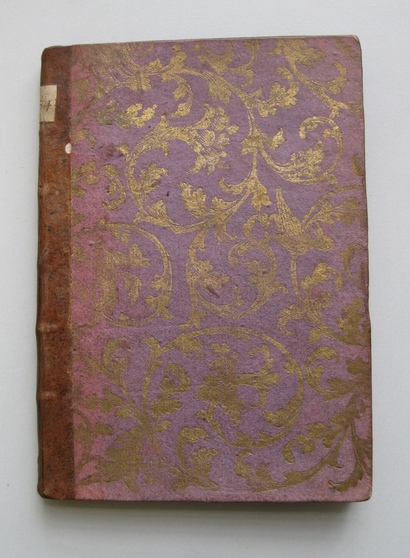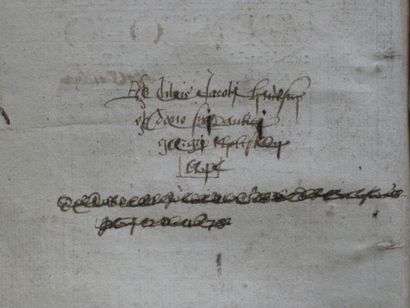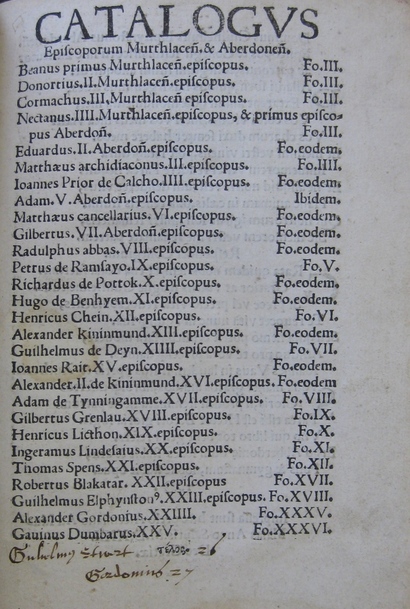Bishops of Aberdeen

Hector Boece (c-1465-1536) is well known for his Scotorum historiae a prima gentis origine, which Worth collected in a 1574 Parisian edition, but this work, his Vitae Episcoporum Murthlacen[sis], & Aberdonen[sis] (Paris, 1522), has not received the same attention. Published by Jodocus Badius Ascensius, whose press is displayed on the titlepage, the book reflects not only Boece’s Aberdonian heritage but also comments on his sojourn in Paris while a student at the Collège de Montaigu. There he had met some of the leading scholars of his day, including Erasmus, and remained to study theology until William Elphinstone, then Bishop of Aberdeen, called him back to Scotland to teach at the newly founded King’s College.
The impact of Elphinstone, both on Boece’ life and on the intellectual history of Aberdeen, is clearly seen in Boece’s text, where Elphinstone’s achievements as bishop loom large. Starting with Beoán (fl. 1012×24), the first bishop of Mortlach, Boece provides the reader with a brief biography of each of the bishops of Mortlach and its successor diocese Aberdeen, down to Bishop Gavin Dunbar (1454×6-1532), to whom the book is dedicated. It is clear, though, that the real focus of the work is William Elphinstone (1431-1514) and his new University of Aberdeen. Boece, given his role as Principal of King’s College, was in a position to offer readers vital information about both.

Front cover.
Elphinstone’s choice of Boece as the first principal of the University of Aberdeen was indicative of his plans for his new institution, which he wanted to be based on the Parisian humanist model. He himself had been initially educated at the University of Glasgow, where he was graduated as a MA in 1462. By 1465 he was studying canon law at the University of Paris and he spent the next five years there, an experience which clearly had a major impact on him. By 1470 he was studying civil law at the University of Orléans before returning to Glasgow in 1471. Appointed Bishop of Aberdeen in 1483 he initiated a reform programme, in which the University of Aberdeen, founded in 1495, would play an important role by providing educated clerics who would further the reform of both church and state. Elphinstone’s decision to appoint Hector Boece was his attempt to inculcate the norms of the Parisian humanist model in this new Scottish university. That Boece was already thoroughly immersed in humanist historiography is readily apparent from his Vitae Episcoporum Murthlacen[sis], & Aberdonen[sis]. As Royan (2004) points out, Boece’s debt to Bartolomeo Platina’s Lives of the Popes, is clear and we know that Boece owned a copy of Platina’s work. Royan reminds us that, though by no means as well known as his Scotorum historiae a prima gentis origine, which was first published by Ascensius in 1527 at Paris, Boece’s history of the lives of the bishops of Aberdeen prefigured many of the themes of his more famous work: in particular the relationship of church and state.

Provenance inscription.
But the work was as much about the future as the past: by contextualising Elphinstone’s many achievements Boece sought not only to praise his great patron but also to encourage his successors (in particular Bishop Gavin Dunbar), to continue the work which Elphinstone had so audaciously begun. The focus on the relationship of church and state was one which would have been appreciated by Dunbar, for Dunbar, who had succeeded Elphinstone’s successor Alexander Gordon in 1518, was well placed to foster links with both church and state. A graduate of the University of St Andrews, he had gained his MA in 1475, and thereafter had moved up the administrative echelons before his eventual appointment as Bishop of Aberdeen. As Bishop, Dunbar did indeed continue many of Elphinstone’s initiatives and was eager to complete Elphinstone’s university building programme but though he may have played an active role in such administrative affairs, he was less responsive to the other theme of Boece’s work: the importance of Parisian links for the University of Aberdeen. Boece emphasises this not only by utilising the Parisian humanist historiographical model but also by choosing to publish the work at Paris. Unlike Boece, Dunbar’s focus was far more local, his attention naturally being drawn to the tumultuous political situation in Scotland, following the defeat at the Battle of Flodden in 1513.

The work is annotated and a late sixteenth-century reader was sufficiently interested in up-dating Boece’s catalogue of bishops of Aberdeen to include the names of Dunbar’s successors up to 1577. The two men could not have been more different: William Stewart (c.1490-1545) had followed faithfully in the model of Elphinstone, not only in his efforts to reform the diocese but also in his advocacy of humanist studies in the university. The focus of William Gordon, who was bishop from 1545 to 1577, was, however, on political and religious conflict. He was less concerned with the university he had himself attended, and more interested in simply surviving the changing fortunes of the Scottish reformation. The annotations also include a number of provenance inscriptions, among which is a certain ‘George Elphinstone’ who was given the book in 1678. By 1722 John Bridges (from whom Worth acquired a number of books), had purchased the text and it was undoubtedly from the latter that Worth bought what Bridges referred to as ‘a very rare book’.

Sources
Johnston, Elva (2004), ‘Beoán(supp. fl. 1012×24)’, OxfordDictionary of National Biography (Oxford University Press).
Jillings, Karen (2008), ‘Humanism and Medicine and Sixteenth-Century Aberdeen’, Intellectual History Review 18: 1, 31-40.
Macfarlane, Leslie J. (2004), ‘Dunbar, Gavin(1454×6–1532)’, OxfordDictionary of National Biography (Oxford University Press).
Macfarlane, Leslie J. (2004), ‘Elphinstone, William(1431–1514)’, OxfordDictionary of National Biography (Oxford University Press).
Macfarlane, Leslie J. (2004), ‘Gordon, William(d.1577)’, OxfordDictionary of National Biography (Oxford University Press).
Macfarlane, Leslie J. (2004), ‘Stewart, William(c.1490–1545)’, Oxford Dictionary of National Biography (Oxford University Press).
Royan, Nicola (2004), ‘Boece , Hector(c.1465–1536)’, Oxford Dictionary of National Biography (Oxford University Press).
Text: Dr Elizabethanne Boran, Librarian, The Edward Worth Library, Dublin.